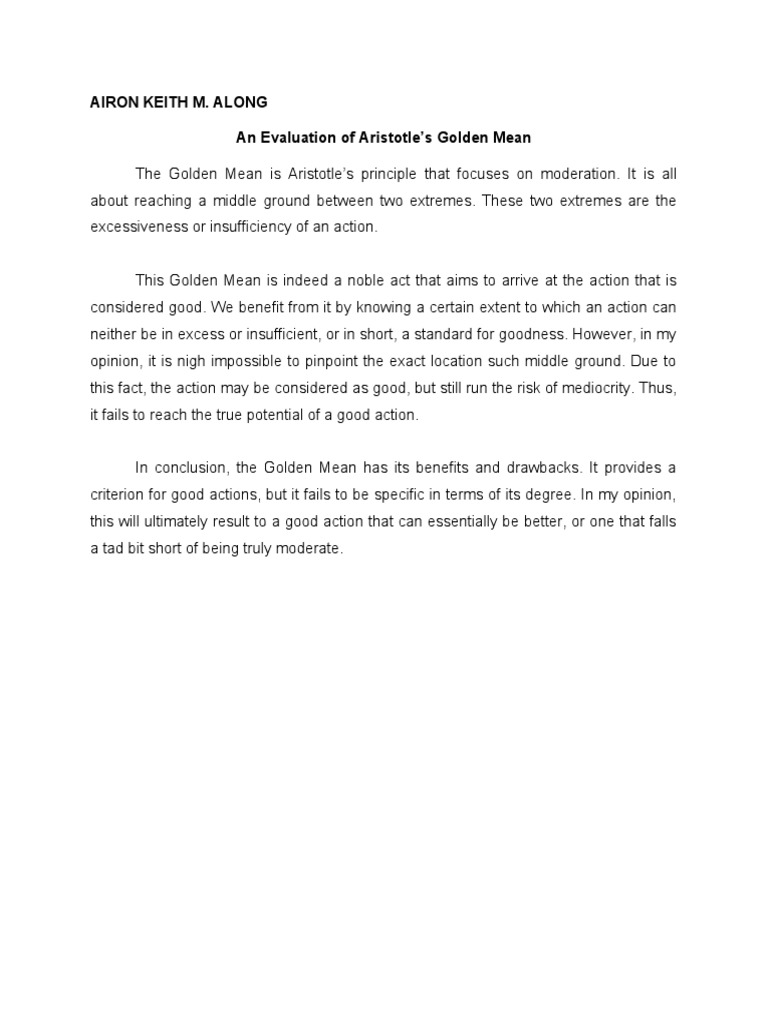Moderation is a concept deeply valued in various philosophical and spiritual traditions. One such tradition that has emerged in modern times is the Bahá’í Faith, which emphasizes the importance of balance, unity, and moderation in all aspects of life. Integrating this perspective with Aristotle’s Golden Mean, we explore the role of moderation in spiritual growth. The question we might pose to ourselves is this: can one truly achieve spiritual enlightenment without embracing the nuances of moderation in their life experiences?
Aristotle, a luminary of ancient philosophy, articulated the principle of the Golden Mean, positing that virtue lies at the midpoint between extremes. This idea serves as a salient foundation upon which we can examine the vital significance of moderation within Bahá’í teachings. The Bahá’í Faith, while rooted in the teachings of its founder, Bahá’u’lláh, also synthesizes elements from various philosophical thoughts, including those of Aristotle. At the heart of this synthesis lies the understanding that excessive indulgence or neglect predisposes individuals to spiritual stagnation.
Moderation can be defined as an approach to life that seeks balance, avoiding the pitfalls of excess and deficiency. In the context of spiritual growth, moderation transcends mere lifestyle choices; it becomes an essential framework for the cultivation of virtues. Bahá’í teachings assert that every individual is endowed with inherent potential, yet this potential can only be realized through the practice of moderation. Whether it involves personal relationships, material possessions, or spiritual practices, moderation serves as a guiding principle.
Imagine the implications of a life devoid of moderation. Can one truly flourish if they succumb to extreme emotional states or unbridled desires? The pursuit of passions is indeed natural, yet unchecked, these passions can lead to detrimental consequences. Within the Bahá’í discourse, the notion of moderation manifests in various forms, including the importance of consultation, humility, and the cultivation of a vibrant inner life grounded in virtues such as love, justice, and wisdom.
The role of consultation in Bahá’í teachings underscores the necessity of engaging with others to achieve a balanced perspective. Consultation is not merely a means of decision-making; it embodies the spirit of collective inquiry. By engaging in honest dialogue with others, community members exercise moderation by incorporating diverse viewpoints, thus avoiding the extremes of unilateral thinking. This collective wisdom fosters growth, enables accountability, and nurtures relationships that flourish in a spirit of love and respect.
Similarly, the value of humility within the Bahá’í framework serves to temper excessive pride and ambition, guiding individuals toward self-awareness and introspection. By cultivating humility, one acknowledges their own limitations and the need for cooperation with others. This self-reflection is pivotal in navigating the complexities of the human experience, allowing individuals to embrace their vulnerabilities without fear or shame. In recognizing one’s own imperfections, the path toward personal growth and spiritual advancement becomes illuminated.
Furthermore, the importance of an active and vibrant inner life is accentuated in Bahá’í teachings, emphasizing the cultivation of virtues through spiritual practices. While devotion and commitment are essential, the challenge lies in maintaining a balanced approach to these practices. Engaging in prayer, meditation, and service to humanity is indeed laudable; however, immersing oneself in these acts to the detriment of personal relationships or self-care can yield negative consequences. Thus, moderation becomes a compass, steering individuals toward a holistic integration of spiritual activities into daily life.
Conversely, moderation also plays a significant role in guiding one’s material pursuits. In a world rife with consumerism and distraction, Bahá’í principles advocate for a measured approach to materials and desires. The teachings encourage individuals to relish the pleasures of material existence without allowing these pleasures to dominate their spiritual and moral compass. The pursuit of wealth, status, or gratification should always be tempered by a commitment to service, generosity, and the well-being of humanity. A serious reflection on the role of moderation in our material life may prompt one to question: are we too focused on the accumulation of possessions, neglecting the spiritual treasures that foster our growth?
The interplay between moderation and spiritual growth does not suggest a simplistic dichotomy between restraint and indulgence. Rather, it invites a rich tapestry of experiences where individuals can navigate the complexities of human existence with poise and balance. The Bahá’í teachings espouse a vision of life that embraces the entirety of the human experience—where joy and sorrow, success and failure, material and spiritual pursuits coexist harmoniously. Such a holistic approach fosters resilience and adaptability, essential traits in the face of life’s inevitable challenges.
To navigate this path of moderation is to recognize the profound interconnectedness of all things. The rich tapestry of human experience is woven with threads of joy and suffering, light and darkness. Embracing moderation ultimately leads to a fuller understanding of life, where individuals not only learn to cultivate the virtues that propel spiritual growth but also harness the lessons embedded in their own experiences.
In conclusion, the integration of Aristotle’s Golden Mean with Bahá’í teachings underscores the pivotal role of moderation in spiritual development. Through the practice of moderation, individuals can glean profound insights that foster resilience. Whether engaging in consultation, exercising humility, or balancing material pursuits, the principle of moderation illuminates the path toward spiritual fulfillment. By asking ourselves how we can embody moderation, we embark on a transformative journey—one that invites us to embrace the essence of our shared humanity and aspire toward a greater collective good.
